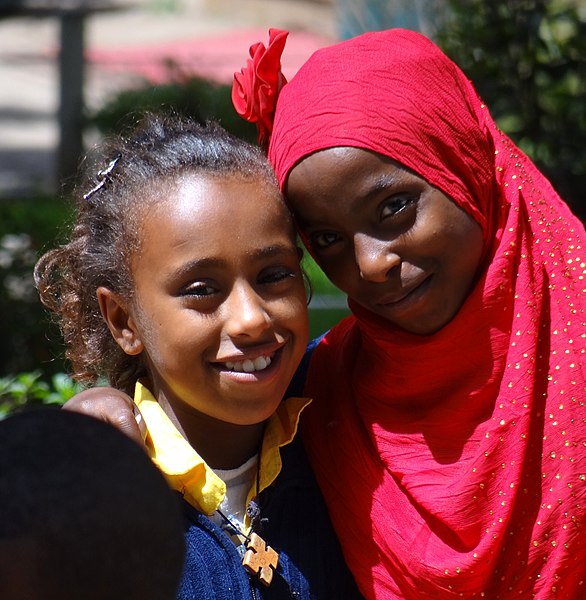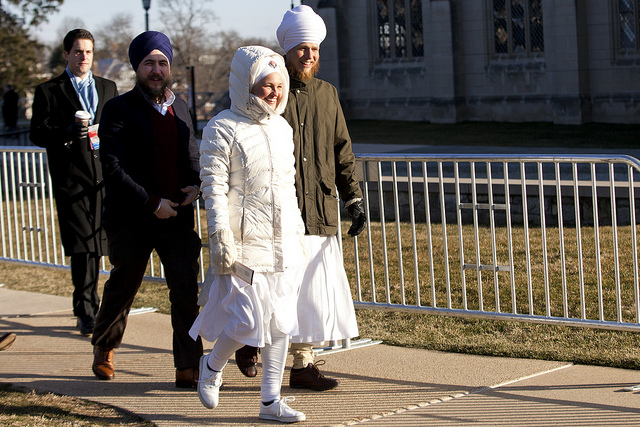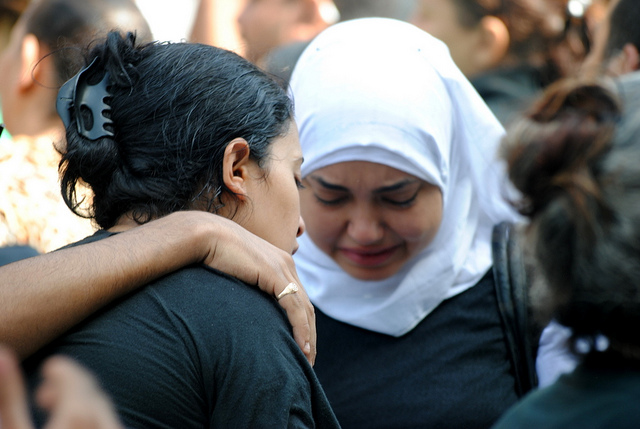Global Plus: Knowing your neighbor’s faith is path toward peace and understanding

Malik, a phone company technician in Algiers, would like people of all faiths to understand that eternal paradise is not a place exclusively for Muslims.
Read, if you wish,
he says, the Quran verse stating, those who believed and those who were Jews or Christians or Sabeans, those [among them] who believed in Allah and the Last Day and did righteousness – will have their reward with their Lord, and no fear will there be concerning them, nor will they grieve.
Subha Ghosh, a Hindu from Kolkata, India, would like the world to know that her religion embraces all the good that is there in any other religion. The path to enlightenment allows no room for bigotry, she believes.
Robert H., a 46-year-old lawyer from Sydney, Australia, wishes that people of other faiths would understand that the most important teaching of Judaism is to treat other people the same way as you, yourself, would like to be treated.
Tony Odionyenma, a businessman from Nigeria, wishes people would understand that Christianity is about peace for all, for Christians and non-Christians. The basic principle, in Scripture and practice, is to love your neighbor as you love yourself and your loved ones.
Peace, universal love in this life and the next, mutual respect. These were the recurring themes when I asked people of different faiths from various parts of the world what they would most like people to know and understand about their religion.
Their answers are a far cry from the images of conflict many of us throughout the world are bombarded with on various media outlets. Politicians, religious leaders, journalists and Twitter and Facebook trolls too often seek to advance their own interests by condemning others.
But this race to the bottom does not have to be the end of the story.
Human beings may be hard-wired since evolution to separate into tribes in response to fear and uncertainty. But science also shows we are capable of working together for the common good when we leave our tribal cocoons and get to know our neighbors in ways that promote understanding.
It starts with listening to one another.

Finding comfort in hate
It did not take long as a doctoral student in England and France to learn about many of the misconceptions of Islam in the West.
During my stay in London, I was happy to see a student in my class in mass communications wearing the hijab. She was from Brunei, and she also looked very happy.
A few days later, however, she had taken off her head scarf. Ida confessed that she could not bear people’s stares and heavy looks. Her husband, worried about her safety, also encouraged her to remove the hijab.
People from our class congratulated her for her courage.
Back then, in 2005, I wondered why these people did not comfort her because she was forced to take off her headscarf.
On another occasion, arriving in Paris on a flight from Algiers, some Algerian women started to take off their hijabs before the plane landed at Charles de Gaulle Airport. One of their concerns was the police reaction to their hijab. They feared they would be denied entry because of their clothes.
People across the world still think that Muslim women are wearing hijab against their will. Yet, in Algeria and in most of the Muslim world, women make their own decisions about whether to wear a head covering.
The Quran makes a recommendation to Muslim women to cover their body in the way she sees fit within the aim not to excite her fellow males. It does not talk about the face and the hands.
Of course, these stigmas are not limited to Muslims.
We, in the Arab and Muslim world, judge the West based on our religious teachings and cultural understanding. That the West is doing the same does not make it any less wrong.
We need to understand other people’s values and beliefs the way they understand them. And to recognize why so many followers of different religions love their faith, and see in it a transcendent purpose that encourages them to love others.
Then, instead of portraying faith in Nigeria as a bloody conflict between the terrorist group Boko Haram and Christian extremists responding with violence, we can open our eyes to the reality of Muslims and Christians huddled together in a hall praying to calm their fears as Boko Haram approached their village.
Among our interviews with people in Nigeria, Sherafa Bello, a telecom expert, said he believes Christianity is all about inner peace and the connection with God.
Shehu Sambo, a Muslim businessman, expressed his wish that people from all other religions would understand the peaceful nature of Islam and its prophet Mohammed. Islam is far away from terrorism and extremism. He said the Prophet of Islam always chooses forgiveness instead of revenge, and this was obvious from his entire life.
Getting to know each other, and listening to what people have to say about their faith in a spirit of humility and mutual respect, can be keys to living together in peace and harmony.
And that is not just faith talking.

Choosing knowledge
A 2010 study of five European nations indicated that having personal contact with Muslims was strongly related to favorable attitudes toward Islam in every country. For example, in the former West Germany, 38 percent of respondents who reported a lot of contact with Muslims reported very positive attitudes; only 1 percent of respondents who had no contact held very positive attitudes toward Muslims.
In the 2007 Faith Matters Survey of U.S. religion, researchers found bringing together people of different religions was not only related to greater acceptance among the faiths involved, but was associated with warmer feelings toward other religions.
Research, the responses from people of faith in different parts of the world and my own work suggest the following approaches would be helpful in building social trust and civility:
- Knowledge is critical: The more we read about other religions and get informed about them, the less we would think of them in a stereotyping way. That means seeking out reputable sources, and avoiding the temptation to rely on publications that affirm your biases.
- So is experience: I liked the initiatives of United Kingdom Muslim communities when they have opened their mosques to all. Visiting a church, having Iftar during Ramadan with a Muslim family, sharing
Shabbat
with a Jewish community, all this and many other activities would enhance our understanding of others’ religious traditions. - It is all our responsibility: Schools, religious communities and parents all can be effective in helping their flocks gain a better understanding of belief systems other than their own.
- Journalist, heal thyself: We need to acknowledge that the media with its various outlets and genres, have played, consciously or unconsciously, a clear role in worsening religious conflicts and fighting. We can be part of the solution through informed, impartial and fair coverage of all religions, focusing not just on conflict and violence but on faith as it is lived in the daily life of religious people and communities.
We know the process of respectful dialogue works.
As part of my role in founding the International Association of Religion Journalists, I was a participant and then a co-moderator of several six-week course-dialogues on religion journalism with more than 200 of my colleagues from 90 nations.
Each conversation started with journalists sharing their misgivings about how the media in other parts of the world misrepresented the majority faith in their region. As the weeks went on, they found their experiences and frustrations in providing quality religion coverage of minority faiths, from editorial disinterest to the difficulties of overcoming cultural biases, were shared by their colleagues.
The conversations were gritty at times, and one time I contacted a fellow Muslim participant privately to tell him not to take the early criticism personally. But both he and the vast majority of participants stayed, ending the sessions with widespread respect for one another, and a determination to improve their own coverage.
I do believe that the shortest way to peace is to know each other correctly, and to achieve this, there is a real need to get in touch with each other in a respectful way.
We need to know the other as they are, not who we expect them to be.
Larbi Megari, co-managing director of the International Association of Religion Journalists, is a television journalist and freelance writer based in Algeria.
Resources
- ARDA National Profiles: View religious, demographic, and socio-economic information for all nations with populations of more than 2 million. Special tabs for each country also allow users to measure religious freedom in the selected nation.
- ARDA Compare Nations: Compare detailed measures on religion on any nation, including religious freedom and social attitudes, with similar measures for up to seven other nations.
- International Association of Religion Journalists. The International Association of Religion Journalists is a collaborative effort of nearly 600 journalists from 90 nations to learn from one another to increase understanding and elevate reporting on religion. The organization’s extensive resources are a trusted source of support for wordwide reporting on religion.
- KAIICID. KAICIID is an intergovernmental organization whose mandate is to promote the use of dialogue globally to prevent and resolve conflict to enhance understanding and cooperation.
- The Pluralism Project This is a web site that encourages interreligious understanding, and helps to show cases of interfaith cooperation and integration.
Articles
- Briggs, David, Charlie Hebdo and the price of freedom denied: Studies find independent courts and civility best protect liberties, lessen conflict. The article explores key research on religious freedom.
- Lewis, Reina, GlobalPlus: Religion and fashion. The article explores how stylish women of many faiths that encourage modesty have embraced coverings or other relevant adaptions of dress and behavior as signs of fashion and faith.
- Megari, Larbi, What sharia law means, and how it is understood throughout the world. An overview of the myths and realities of Sharia.
- Scieur, Marie-Luce, Trois religions pour un seul dieu. The article (in French) explores various aspects related to Islam, Judaism and Christianity.
Books
- Ed: Deming, W., Understanding the Religions of the World: An Introduction. The book explores the major religions in the world.
- Palmer, S., and O’Brien, J. 60 minutes pour connaitre les religions du monde. (Sixty minutes to know the world’s religions.)
- Ed., Volf, Miroslav, Do We Worship the Same God? Jews, Christians and Muslims in Dialogue. This volume brings Jewish, Christian, and Muslim philosophers and theologians together to answer this question, offering rare insight into how representatives of each religion view the other monotheistic faiths.
Photo Credits
Image by Adam Jones, via Wikimedia Commons [CC BY-SA 2.0]
Image by PBS NewsHour, via Flickr [CC BY-NC 2.0]
Image by Lilian Wagdy, via Flickr [CC BY 2.0]
